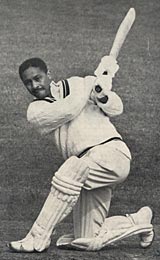World Cup Diary
With a little admission about ticket prices and another message to fans to bring in the noise, even the ICC seem to have acknowledged fears expressed beforehand about the tournament, a situation superbly captured by Paul Harris in his Sunday
As for my driver, he’d have to fret and fume for half an hour before the religious chants that he didn’t know or care for gave way to the highpoint of his day
The islands of St Kitts and Antigua are separated by just 63 miles of water, but in terms of preparedness for this World Cup, they might as well be at opposite extremes of the widest ocean on the planet
|
| ||
|
| ||
|
|

|
‘Old talk’ with an elderly family friend, because Debita Harripersaud is fond of that kind of natter, was the spur to make the product which launched a great Guyanese nostalgia
By the time we exit the press box after an ultimately thrilling first game at Guyana's new stadium, it's almost nine
There are places I remember all my life, though some have changed , sang the Beatles in the days when one-day cricket was restricted to a Gillette Cup and little else
From St Kitts to Antigua: a cockpit experience
|
| ||
|
| ||
|
|

|
